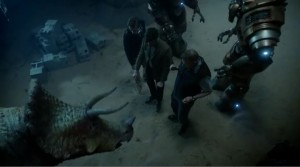
Dinosaurs! Robots! Time Lord! (Image © BBC)
One of the often-cited strengths of Doctor Who as a series is the flexibility of its concept—when your one permanent concept is an alien do-gooder with a time-and-space machine shaped like a police box, well, there’s not a whole lot you can’t do with that. Mostly, people refer to this wide-open imaginative potential when the show goes from an outer space shoot-’em-up one week to a gaslit Victorian costume drama the next.
This past Saturday night, though, we got “Dinosaurs on a Spaceship” as an illustration of that idea executed concurrently rather than consecutively. I’m sure that this one originated with a one-line brief (“Dinosaurs! On a spaceship!“) and a story conceived that way could have been knocked off in a perfunctory and disappointing way. But no, for this one, writer Chris Chibnall and director Saul Metzstein (with, I have no doubt, plenty of input from showrunner Steven Moffat) seemed to throw everything but the kitchen sink into one big crockpot of an episode. Dinosaurs. Spaceships. Silurians. Not one, but two Harry Potter actors. Lestrade from Sherlock. Bitchy robots. The straight-up nastiest villain the show’s seen in a while. Gender politics played for laughs. An Indian Space Agency. Queen freakin’ Nefertiti!
And you know what? The goulash that emerged from that (metaphorical) crockpot might not have been the most “nourishing” meal our Saturday night Who brains have ever consumed, but it was certainly rich and certainly satisfying.
Spoilers ahead, by the way…
I think the reason “Dinosaurs on a Spaceship” was, ultimately, a successful episode was that for all the stuff Chibnall et al threw into the mix, the core of it was one of the more solid Doctor Who plots we’ve seen in a while. (Skip to the next paragraph if you haven’t watched it yet, ’cause I’m about to illustrate my point about the solidity of the plot by explaining the big reveal we got halfway through the episode.) The ignorant rapine of an unscrupulous trader (read that as “soulless capitalist” if you wish) not only utterly ruins the mission of a spaceship, but dooms himself in the process, unless he can trick or force our hero into saving him. See, I think that’s a great central concept, as long as the creators do a good job of making us care about the incidentals… which they really do.
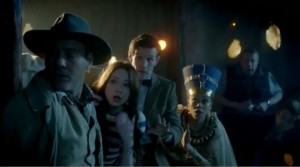
Really, only fifty years of Doctor Who can justify this shot (Image © BBC)
On the face of it, it’s an insane number of layers to roll into one 45-minute piece of television, and yet they managed it and managed it well. We had the race-against-time of the impending crash (with bonus missiles), the mystery of the ship’s nature, and the menace of Solomon as the big main layers, mortared together by the consistently entertaining character presentation.
Yes, a reasonable person could complain that it’s never explained exactly why the Doctor felt the need to recruit the fiery Nefertiti (Riann Steele), or the comedically sexist Riddell (played with manliest gusto by Rupert “Inspector Lestrade” Graves, rapidly becoming one of my favorite British actors), but in my opinion that would be missing the point. If their only purpose in the story was to be a sort of ersatz screwball-flavored Amy & Rory analogue for Amy’s turn as a sort-of-Doctor, then that would have more than justified their inclusion. (While some may disagree that they did any more than that, in my opinion they did and both the performances and the story were better for it.)
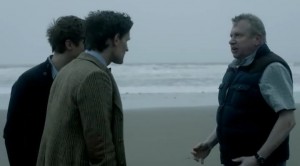
I can’t blame him for being a bit freaked out (Image © BBC)
Rory’s dad Brian, played by the perfectly-cast Mark “Arthur Weasley” Williams, was a lovely thread within the story. Amy and Rory are so experienced that they get to function on occasion as mini-Doctors themselves, while as one-off guest stars with strong personalities, Nefertiti and Riddell wouldn’t be convincing in the traditional companion role. So instead we’re given Brian, a perfectly lovely, old-school British dad who gets to view this absolutely bonkers (albeit kind of typical) day in the life of our favorite time-traveling adventurers through utterly human eyes, and in the process go from befuddled and provincial to, well…
Brian: We can. Me and Rory. We must be the same gene-thingy you just said.
Doctor: Brian Pond, you are delicious.
Brian: I’m not a Pond.
Doctor: ‘Course you are.
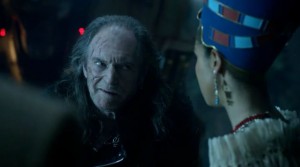
Ooh, he’s a mean one! (Image © BBC)
Meanwhile, as his turns as Harry Potter‘s Argus Filch and Game of Thrones‘ Lord Walder Frey have proven, when you want small, mean, nasty, and rotten-to-the-core, you call David Bradley. His venom-spitting, tiny-souled Solomon was an amazingly complete and satisfying antagonist for the Doctor given that he only turned up about halfway through the episode. And while, yes, the practical upshot of his little scheme was the possible destruction of Earth, the fact that it was caused not by a megalomaniacal desire for universal domination or a murderous long-standing hatred for the Doctor but by simple, uncaring, petty greed was refreshing.
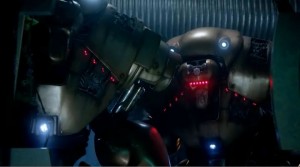
You’re going straight on the naughty step! (Image © BBC)
While I’m totally unfamiliar with the (apparently quite successful) British comedy duo Mitchell and Webb, they were an absolute scream as Solomon’s perpetually bitching, idiotic robot sidekicks. That the hulking robots managed to be constantly hilarious but genuinely threatening when they were needed to be was one of this episode’s many smaller delights. There were other touches, too, subtly woven into to this otherwise hugely romp-y tapestry—the utterly believable conceit that India will have the space agency responsible for Earth’s protection in the future was probably one of my favorite bits.
Oh, the dinosaurs themselves? Frankly, when all was said and done they wound up as almost an afterthought, nearly lost in the stampede of other madly entertaining bits that stuffed the episode. They wound up being a means to an end—they were an illustration of the spaceship’s mission, the obligatory pack of velociraptors was just an excuse for more hilarious verbal sparring between Amy and Riddell, and the triceratops with a thing for Brian’s golf ball was both a convenient ride and an excuse for Solomon to Kick the Puppy.
All in all, yes, this was new-style Doctor Who par excellence—manic, bonkers, high-concept, and effectively grounded by a well-established heart of gold underneath it all. Okay, okay, in the spirit of gleeful abandon embodied by this episode, I’ll give in to temptation and make the ridonkulously obvious Samuel L. Jackson reference:
I was never tired of these megglefrexin’ dinosaurs on this megglefrexin’ spaceship!
(Oh, one more note: I was finally clued in to the fact that the opening sequences of both the episodes we’ve gotten so far this season have featured logos with story-appropriate “skins”—Dalek bumps for “Asylum of the Daleks” and scaly reptile skin for this one. If they’re gonna keep it up the whole season, it could be a lot of fun. Or gimmicky. Or both. We’ll see…)
You know, I’m *almost* with you on this one! I kinda, sorta like dthis episode. And I’d be totally on board if not for some rather big wrenches in my works!
First, you and I couldn’t disagree more about the robots as played by Mitchell and Webb. While “Doctor Who” has never shied away from being a “kids programme” I always felt that ‘New Who’ was more for, say, young adults while “The Sarah Jane Adventures” was more for the straight youngsters.
These robots put DW on par with SJA and, quite frankly, were about as obnoxious as Jar Jar Binks in “Star Wars: Episode I” or the jive-talking robots from the second Transformers movie. In a word, yecccchhh.
Second was the idea that the Doctor is haphazardly pulling people from history for his “gang”. While this seems to be part-and-parcel of the Moffat years, this seems to be the first time that he’s pulled a major historical figure along for the ride (others have accompanied him on adventures in their own time). I guess we’re left to assume that he pulled Queen Nefertiti out of her personal timestream after all her fixed-points-in-history were through? After all, God forbid she had died while with him. How, exactly, would he have explained that?
One (of a few) area on which we do agree is that the episode was likely concocted out of one brief sentence… “Dinosaurs… on a spaceship”. This, to me, is another hallmark of the Moffat years which has frustrated me since he took over; the idea that he (or whoever) comes up with a simple, yet exciting logline (or series of trailer moments) for an episode and then is forced to try to build around that. Heaven forbid we actually think a story through so that things happen organically. While this episode wasn’t particularly terrible because of this, the presence of the dinosaurs on the spaceship seemed really to serve no actual purpose other than to serve the ridculous title of the episode.
That said, I REALLY loved Mark Williams as Rory’s dad. He was, as you say, perfectly cast. And the role that he was given was well-crafted and his arc was most satisfying. As was Amy’s. The idea that Amy has picked up enough of Doctor-isms over the years to make her more than just a pretty face is wonderful. What makes this work so well, to me, is Amy’s attitude. It’s a lot like when Donna became part-Time Lord. She had the Doctor’s mind, but with that wonderful Donna attitude. Amy was very much the same way which, to me, almost BEGS to have her get her own spin-off (which will only happen in a Fringe-like alternate universe).
We are left with this minor mystery moving forward of why NO ONE seems to know who the Doctor is. I’ll be curious to see how this is explained and how the Doctor has to go about undoing this little bit of nonsense.
Just two quick responses to points you made:
As far as Queen Nefertiti goes, the episode’s opening scene makes me wonder exactly how much say the Doctor had in her presence… if any.
And I definitely disagree that “the dinosaurs… seemed really to serve no actual purpose other than to serve the ridculous title of the episode.” If nothing else, they were the left-behind cargo that demonstrates the nature of the ship (it’s a Silurian colonization ark) and, by inference, the horror of Solomon’s genocidal act. Plus, from a purely storytelling standpoint, they provided some fun (and mysterious/intriguing) peril in the environment in the part of the story before Solomon’s revelation. Both, to my mind, very legitimate purposes for their presence.